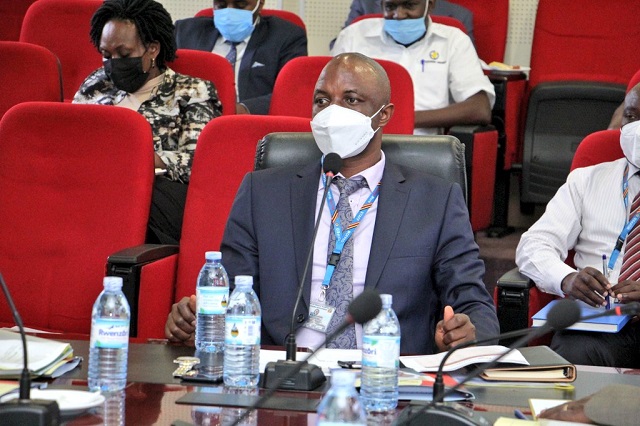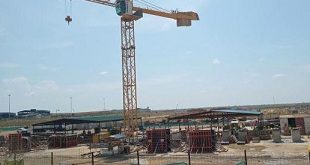
Can he achieve it when the economy is still grappling with COVID-19?
Kampala, Uganda | THE INDEPENDENT | Ramathan Ggoobi, the new Permanent Secretary at the Ministry of Finance/ Secretary to the Treasury (PSST) is promising to design and improve on a number of policies to achieve an all-inclusive economy.
On Sept.01, he delivered a keynote address virtually from his office, before accountants who had gathered for the 9th CPA Economic Forum.
He said, in the short-term, all economic interventions that he will advocate for will be geared towards turning around the fortunes of the COVID-19 hit economy to benefit.
He said he will not allow misuse of public funds. “For as long as I am in this office, any government project that takes money…those behind it will have to show results on the ground and not on paper.”
But key questions have since emerged since Ggoobi took over from the long serving, Keith Muhakanizi. Can he succeed now that the economy has been broken by the COVID-19 pandemic? How easy is it for him to cordially work with the long serving technical personnel within the ministry and line spending agencies to achieve the results he wants?
“I have always said that this country has designed many good policies but one that is missing is a policy on implementation,” he said.
Ggoobi first took back the accountantss to Uganda’s economic history. He said, the economy, before 2019 when COVID-19 hit, grew at 6.3% and 6.4% in FY2017/2018 and FY2018/2019 respectively.
This growth was significantly higher than the average growth of 4.4% in the previous five years.
Earlier, it had been projected to grow by 6.5% on average in the medium term.
There was a stable macroeconomic environment – low inflation, stable exchange rate and fiscal and debt sustainability.
Other socio-economic indicators were also improving, he said, as poverty had declined to 21.4% in 2016/17 from 31.1% in 2005/06.
But, Ggoobi said, COVID-19 spread and lockdown measures negatively impacted the economy and peoples’ welfare. He said, a total of 100, 000 formal and 4.4million informal jobs/livelihoods were lost during the height of the pandemic and associated lockdowns.
Overall, there was a decline in economic growth of between 3 and 4 percentage points in FY2019/20 and 2020/21 against targeted growth.
Most affected sectors were trade, tourism, and hospitality, education, transport, entertainment, manufacturing and construction.
Ggoobi said the slowdown in economic growth affected government’s financial position leading to revenue losses against an increase in expenditures required to deal with the pandemic.
Saving the economy
Ggoobi said he will lead the efforts aimed at undertaking immediate and short-term strategies to support economic recovery from the COVID-19 pandemic.
Among the short-term measures, Ggoobi said, are maintaining households’ economic welfare through boosting aggregate demand by creating jobs for the most vulnerable – labor-intensive public works and emergency social protection.
He said, the ministry of finance is designing a programme to benefit the youth and women for this cause.
The other areas, he said, have to do with supporting enterprises to mitigate the negative impact of the crisis through provision of tax and credit relief and increasing access to low interest financing to most affected sectors via Uganda Development Bank and Uganda Development Corporation.
He also said, tangible support in terms of financing will go towards supporting SACCOs and village saving groups through the microfinance support centre and other finance institutions.
In addition, he said, the most critical interventions at this time include wide-spread vaccination of the population against COVID-19 which will allow relaxation of lockdown measures and full re-opening of the economy.
The other area is to improve public sector efficiency and enhance fiscal governance, to achieve value for money.
“I want to restore budget discipline,” he said, “this tendency of having supplementary budgets in the first month of the new financial year is not good for us.”
He also said, government is having serious conversations on how to manage public debt, which might compromise future investment plans, key for improving peoples’ livelihoods.
Beyond this, Ggoobi said, he will continue to take lead in implementing policies for long term growth and development goals by focusing on implementation of NDPIII growth and development objectives, that have a connection with rapid industrialization, increasing production and productivity in the agriculture sector, nurturing the potential of ICT, sustainably using country’s natural resources, strengthening the country’s regional and international competitiveness and hence securing market access for Uganda’s products and services.
About CPA Economic Forum
The CPA Economic Forum is an annual event that brings together experts from various sectors to discuss, share thoughts and generate solutions on salient issues that affect development of the economy.
Over the years, deliberations have been premised on significant challenges in the country and policy recommendations shared with government and other key stakeholders.
This year’s theme was “Supporting Economic Recovery & Business Continuity in the COVID 19 Era” focusing on building resilience in businesses to overcome the challenges posed by COVID-19 in the country.
****
 The Independent Uganda: You get the Truth we Pay the Price
The Independent Uganda: You get the Truth we Pay the Price



